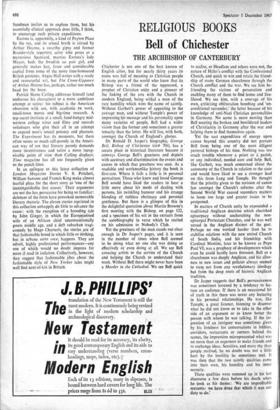Bell of Chichester RELIGIOUS BOOKS
THE ARCHBISHOP OF CANTERBURY
Chichester is not one of the best known of English cities, but for nearly thirty years its name was full of meaning to Christian people in many parts of the world who knew that its Bishop was a friend of the oppressed, a prophet of Christian unity and a pioneer of the linking of the arts with the Church in modern England, being withal a man of the rare humility which wins the name of saintly. Without Garbett's power of appealing to the average man, and without Temple's power of impressing his message and his personality upon many varieties of people, Bell had a wider vision than the former and sometimes a greater tenacity than the latter. He will live, with both, amongst the Church of England's glories.
Dr Ronald D. Jasper's biography, George Bell, Bishop of Chichester (our 70s), has a ' secure place in historical literature because it conveys George Bell's greatness and depicts with accuracy and discrimination the events and causes in which that greatness was seen. As a readable and workmanlike history the book is first-rate. Where it fails a little is in personal portraiture. Those Who knew and loved George Bell would have liked The readers to hear a little more about his mode of dealing with persons, his twinkling humour and his strange blending of ruthless obstinacy and personal gentleness. But there is a glimpse of this in the delightful quotation about Martin Browne's first meeting with the Bishop, on page 122, and a specimen of his wit in the extracts from the autobiography in verse which he recited on his admission to Nobody's Club.
Yet the greatness of the man stands out clear enough in Dr Jasper's pages, and it is seen in the number of times when Bell seemed to be doing what no one else was doing so effectively or even doing at all. We see Bell arousing artists to the service of the Church and helping the Church to understand their work. Without Bell there might never have been a Murder in the Cathedral. We see Bell quick to realise, as Headlam and others were not, the nature of Hitler's conflict with the Confessional Church, and quick to win and retain the friend- ship of many German churchmen through the Church conflict and the war. We see him be- friending the victims of persecution and enabling many of them to find home and live- lihood. We see him, with a courage of his own, criticising obliteration bombing and 'un- conditional surrender,' the latter because of his knowledge of anti-Nazi Christian personalities in Germany. No scene is more moving than Bell meeting the broken and bewildered leaders of Christianity in Germany after the war and helping them to find themselves again.
Yet the vast expenditure of energy upon causes beyond this country did not prevent Bell from being one of the most diligent pastoral bishops of his time. Nothing was too much trouble whenever a priest or a- parish, or any individual, needed care and help. Bell, like Garbett, was much concerned about the autonomy of the Church in relation to the state and would have liked to see a stronger lead on this from Lang and Temple. He thought that the priority given to the revision of canon law amongst the Church's reforms after the Second World War caused secondary matters to loom too large and greater issues to be postponed.
In matters of Church unity he expounded a traditional Anglican doctrine which cherished episcopacy without unchurching the non- episcopal Protestant Churches, and he was well versed in the Anglican divines of the past.
Perhaps no one worked harder than he to stabilise relations with the new united Church of South India, and his friendship with Cardinal Montini, later to be known as Pope Paul VI, was a prophecy of developments which even he could hardly have foreseen. Bell as a churchman was deeply Anglican, and his alive- ness to new issues and policies always seemed to stem not from any revolutionary ideology but frtiin the deep roots of historic Anglican tradition.
Dr Jasper suggests that Bell's persuasiveness was sometimes lessened by a tendency to lec- ture an audience. If there is an occasional bit of truth in this there was never any lecturing in his personal relationships. He was, like Temple, a great listener, listening to discover what he did not know or to take in the other side of an argument or to know better the person with whom he was talking. If the im- pression of an intriguer was sometimes given by his fondness for conversations in lobbies, corridors, restaurants or corners behind the scenes, the impression misrepresented what was no more than an eagerness to make friends and to exchange ideas. Sensitive, and more shy than people realised, he no doubt was not a little hurt by the hostility he sometimes met. It was then that the two saintly qualities came into their own, his humility and his inner serenity.
These qualities were summed up in his last discourse a few days before his death when he took as his theme: 'We are unprofitable servants: we have done that which it was our duty to do.'


































 Previous page
Previous page